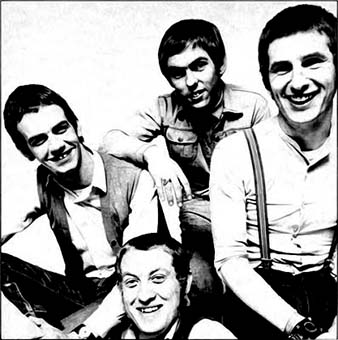Slade - Then and Now
DISC JOCKEY JOHN PEEL TAKES AN OBJECTIVE LOOK AT SLADE'S MUSIC
 "Stand by" they said, "for a new group that'll really blow your mind. No kidding;' they said, "These boys are different. Wait till you hear them" they said, "then you'll know what it really means to flip” Thus spake Peter Jones in the first paragraph of his sleeve-note to a 1969 LP called "Beginnings" by Ambrose Slade. As informed folk all over the galaxy are aware, Ambrose Slade eventually became Slade, and "Beginnings" (released on Fontana STL 5492) must now be some sort of a collector's item.
"Stand by" they said, "for a new group that'll really blow your mind. No kidding;' they said, "These boys are different. Wait till you hear them" they said, "then you'll know what it really means to flip” Thus spake Peter Jones in the first paragraph of his sleeve-note to a 1969 LP called "Beginnings" by Ambrose Slade. As informed folk all over the galaxy are aware, Ambrose Slade eventually became Slade, and "Beginnings" (released on Fontana STL 5492) must now be some sort of a collector's item.
Certainly I had never seen or heard the album before and I had to go to the BBC's record library for the copy I did hear. "Beginnings" is a remarkable LP - not so much for the music that is on it but rather for the pointers which indicate not only what Slade have done since, but directions they may take in the future. The opening track is "Genesis" which, together with "Roach Daddy" was released as a single (Fontana TF 1015). "Genesis" starts with an electronic whine and wind noises and evolves into a fairly moody instrumental, featuring a bevy of electronic effects but displaying at once that Slade were, even at this early date, better than average on their chosen instruments.
"Genesis" is followed by "Everybody's Next One”, one of two Steppenwolf songs on the LP. The other is the classic "Born To Be Wild;' which was later re-recorded for the "Slade Alive" album. On both of these there are strong indications of the Slade to come. Noddy's voice was already taking on the strong identity it has now - and this was recorded at a time when lead singers tended toward blandness and anonymity. The third track on Side 1 is "Knocking Nails Into My House" and this, a song written by Jeff Lynne who was then with Idle Race but now leads The Electric Light Orchestra, shows the band's Midland origins. The song and Ambrose Slade's treatment of it show the strong influence The Move had on popular music all through the region. There's some particularly fine guitar from Dave Hill here and the sound of nails being knocked in, Noddy yells "Look out" and the music is submerged beneath the uproar of the collapsing house. "Roach Daddy;' which follows, has a walking beat and a vaguely country-ish feel to it.
The vocals are a bit hesitant and this has to be one of the least satisfying tracks on "Beginnings” Ambrose Slade next turn their attention to "Ain't Got No Heart”, a nifty wee piece written by the curious Frank Zappa, leader of the Mothers of Invention. Zappa numbers are never easy things to play, involving numerous musical changes and vocal stylings which are often odd, to say the least. The embryo Slade acquit themselves well here and by this stage of the LP the impression is growing that the band and producer Roger Wake are anxious to prove that this is a group with the ability to work successfully on a wide range of material.
"Pity The Mother;' which ends Side 1, heightens this suspicion. A Holder/Lea composition, it features more excellent guitar work and a basinful of tricky drumming from Don Powell. Side 2 opens with a number more representative of Slade as they are today. It's called "Mad Dog Cole;' all four members of the band took up their pencils to write it, and it's a solid rocker. There's an interesting section in which someone sings falsetto along with the lead guitar, following Dave's fast playing note for note. Not an easy thing to do and for this reason, and for Jimmy Lea's crunching bass playing, this is, for me, the best and the most interesting track on the LP. Ambrose Slade ring the changes yet again for the next track, which is another song written and performed by a major Midlands band, the Moody Blues.
It's Justin Hayward's "Fly Me High" and the main interest here comes from the band's flexibility, their skill and from the fact that, briefly, Noddy sounds like Rod Stewart. Marvin Gaye's "If This World Were Mine" follows but it is not a success. The sleeve-note to "Beginnings" claims that Ambrose Slade give Lennon/McCartney's "Martha My Dear;' which comes after "If This World Were Mine;' "a somewhat astonishing new treatment” Despite featuring Jimmy Lea at the controls of his violin, the band stick fairly closely to the Beatles' original. "Born To Be Wild" is next, Noddy giving the lyrics, written by the extraordinarily named Mars Bonfire, a fair old going over. The quartet sound at their happiest on rockers and they end with another highlight, "Journey To The Centre Of Your Mind” This was originally performed by the American Amboy Dukes -at this period (1969) personal favourites of mine - and the Ambrose Slade version of "Journey" is no less hairy than the original.
"Beginnings" is an extraordinary LP -I wish I didn't have to return this copy to the BBC because it shows so clearly all those features that were to lead, several years later, to the string of huge successes that Slade have to their credit. I'm slightly embarrassed that so-called experts like myself failed to notice the signs.
